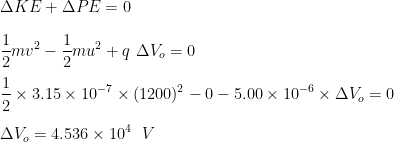3. Two infinite sheets of equal and opposite charge are placed facing each other with a distance of 1.50 m separating them. The positive sheet is on the left and the negative sheet is on the right. If a lone point charge of -5.00 µC with a mass of 3.15 x 10-7 kg is at the midpoint between the plates and is released from rest, it reaches the positive sheet with a speed of 1200 m/s. a) Through what electric potential difference did the point charge move?
3. Two infinite sheets of equal and opposite charge are placed facing each other with a distance of 1.50 m separating them. The positive sheet is on the left and the negative sheet is on the right. If a lone point charge of -5.00 µC with a mass of 3.15 x 10-7 kg is at the midpoint between the plates and is released from rest, it reaches the positive sheet with a speed of 1200 m/s. a) Through what electric potential difference did the point charge move?
Related questions
Question

Transcribed Image Text:3. Two infinite sheets of equal and opposite charge are placed facing each other
with a distance of 1.50 m separating them. The positive sheet is on the left and the
negative sheet is on the right. If a lone point charge of -5.00 µC with a mass of
3.15 x 10-7 kg is at the midpoint between the plates and is released from rest, it
reaches the positive sheet with a speed of 1200 m/s.
a) Through what electric potential difference did the point charge move?
Expert Solution
Concept
Using work-energy theorem
The Sum of change in kinetic energy of a particle and change in potential energy of a particle is zero.
Now change in kinetic energy of the particle is given by

Where m = mass of the particle, u = initial speed of the particle, v = final speed of the particle
Change in electric potential energy is given by

Where q = Charge on the particle,  = Potential difference
= Potential difference
Using work-energy theorem

Answer
Charge on particle 
Mass of particle m = 3.15 × 10- 7 kg
Initial speed of particle u = 0 m/s (at rest)
Final speed of particle v = 1200 m/s
(a)
Let  = Electric potential difference
= Electric potential difference
Then using the work-energy theorem

Step by step
Solved in 3 steps with 7 images
